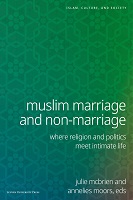Muslim Marriage and Non-Marriage
Where Religion and Politics Meet Intimate Life
Contributor(s)
McBrien, Julie (editor)
Moors, Annelies (editor)
Language
EnglishAbstract
Perspectives and practices of couples in unconventional Muslim marriages.
Unconventional Muslim marriages have been topics of heated public debate. Around the globe, religious scholars, policy makers, political actors, media personalities, and women’s activists discuss, promote, or reject unregistered, transnational, interreligious and other boundary-crossing marriages. Couples entering into such marriages, however, often have different concerns from those publicly discussed. Based on ethnographic research in Europe, the Middle East, North Africa and Asia, the chapters of this volume examine couples’ motivations for, aspirations about, and abilities to enter into these marriages. The contributions show the diverse ways in which such marriages are concluded, and inquire into how they are performed, authorized or contested as Muslim marriages. These marriages may challenge existing ties of belonging and transform boundaries between religious and other communities, but they may also, and sometimes simultaneously, reproduce and solidify them.
Building on insights from different disciplines, both from the social sciences (anthropology, political science, gender and sexuality studies) and from the humanities (history, Islamic legal studies, religious studies), the authors address a wide range of controversial Muslim marriages (unregistered, interreligious, transnational, etc.), and include the views of religious scholars, state authorities, and political actors and activists, as well as the couples themselves, their families, and their wider social circle.
Ebook available in Open Access.
This publication is GPRC-labeled (Guaranteed Peer-Reviewed Content). Contributors: Joud Alkorani (Radboud University), Rahma Bavelaar (University of Applied Sciences Leiden), Loubna Elmorabet (University of Amsterdam), Annerienke Fioole (University of Amsterdam), Shifra Kisch (University College Utrecht), Iris Kolman (University of Amsterdam), Martijn de Koning (Radboud University), Eva F. Nisa (Australian National University), Ibtisam Sadegh (University of Malta), Samah Saleh (An-Najah National University), Vanessa Vroon-Najem (Amsterdam Museum), Dina Zbeidy (University of Applied Sciences Leiden).


 Download
Download